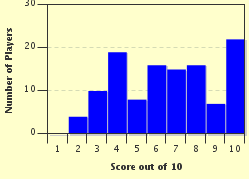Quiz Answer Key and Fun Facts
1. Among anesthetics, propofol is listed as an essential medicine for children. How is propofol commonly administered?
2. Acetaminophen is listed as a drug for pain and palliative care. What is the other name for acetaminophen?
3. Another drug listed for palliative care is a benzodiazepine. Which of the following is a benzodiazepine?
4. Which of the following drugs can be used in anaphylaxis?
5. This one listed is not exactly a drug. But which of the following is named as an important entity in antidotes and other substances used in poisoning?
6. Which of the following drugs do you think can be listed as an anti-epileptic drug?
7. This particular drug, albendazole, is what type of antibiotic?
8. Rifampicin is listed as an essential drug for the treatment of which bacterial disease?
9. Fluconazole is listed as an antibiotic drug to be used against what infection?
10. Cyclosporin, a listed immunosuppressant drug would probably be used in what?
Source: Author
Saleo
This quiz was reviewed by FunTrivia editor
rossian before going online.
Any errors found in FunTrivia content are routinely corrected through our feedback system.


